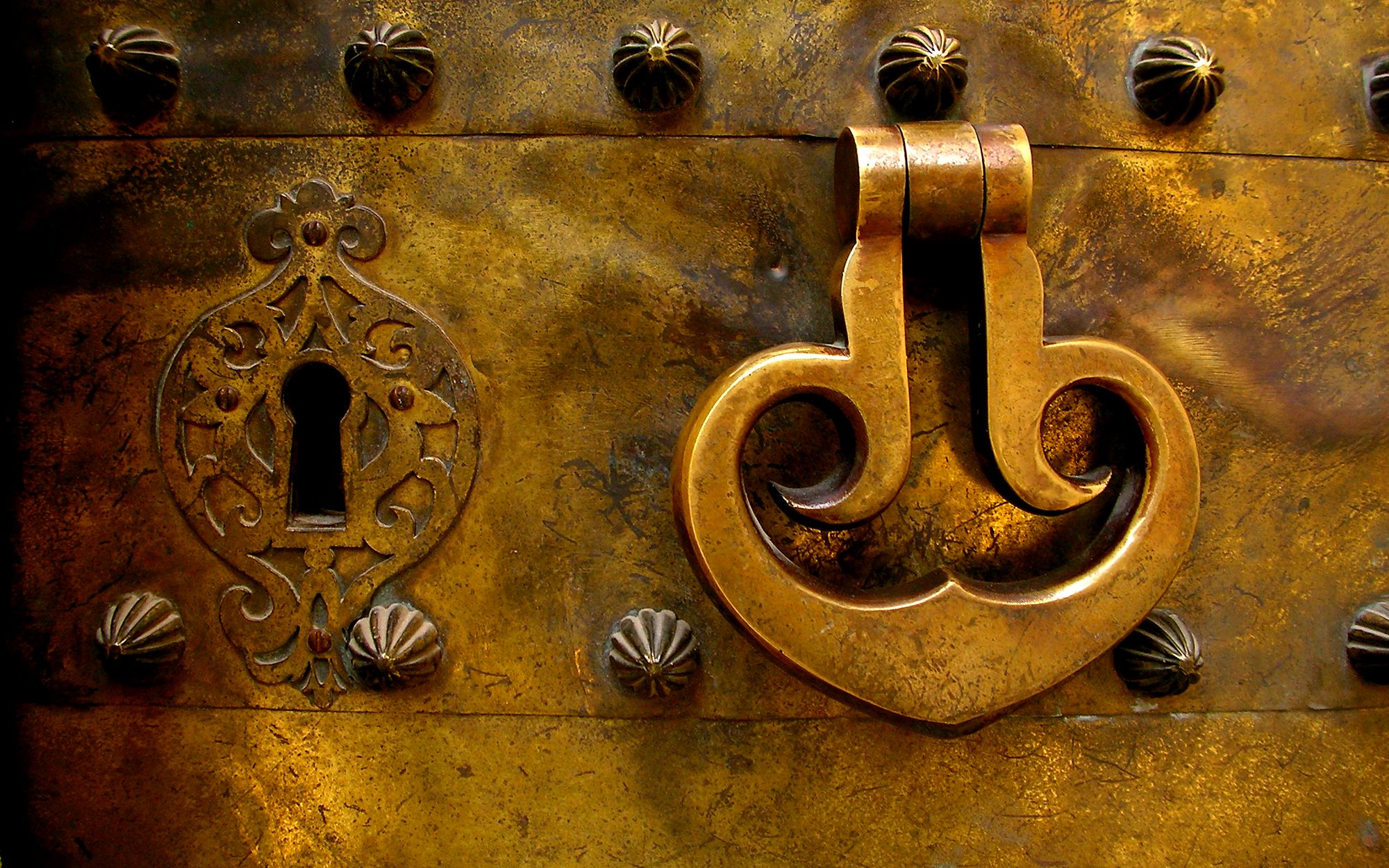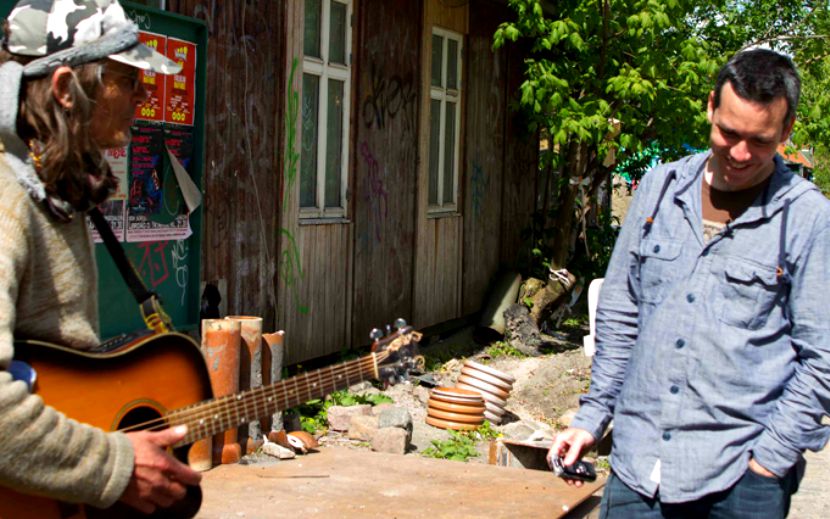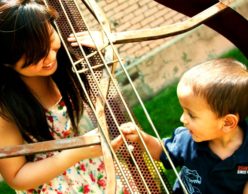Hey Dad, Are We White?

Discussing atheism at the breakfast table with your Mexican-Japanese-“kinda”-Jewish-American Mash-Up kids: This is the life of Nathan Thornburgh, editor, publisher and co-founder of Roads & Kingdoms, a provocative travel and culture journal with an eye on food, war, and sport. If you haven’t read it yet, hurry. We’re not the only fangirlz of the R&K team; a guy you may have heard of, Anthony Bourdain, is their investor and partner.
Thornburgh, a Jewish-American Mash-Up and longtime foreign correspondent who has lived and traveled around the world, is now settled on the Upper West Side of New York City with his Mexican-Japanese-American wife, Julia, and two kids, Dalia and Nico. He sat down with us to discuss his thoughts on Asian daters, Americans abroad, and what to do when your mash-up kids ask if they’re white or not. Hint: It’s complicated.
So you describe yourself as “kinda” Jewish. What does that mean?
My Jewish side is pretty far fallen. The main line of our family were Christmas Jews. We love trees for Christmas and pork for seder. It’s not religious at all. My mom actually converted to Judaism, but both her parents were Protestant ministers. I’ve got enough religion in me that the Bible is alright with me. My son, Nico, went to Catholic preschool.
Why a Catholic school?
After trying a whole gauntlet of bloodless Montessori schools in our neighborhood, we found a school, Holy Name of Jesus, that just had a very loving environment. It did make for interesting breakfast table conversation while he was there. My son would say something like, “Jesus loves all of us” over cereal, and my world-weary daughter, Dalia, who was six at the time, would just shoot him a look and say “There’s no such thing as Jesus.” She’s an atheist.
How did she become an atheist? Are you an atheist?
When religion comes up at home, we say we don’t really know. Like, “I don’t believe those stories are true, but there might be something there.” But you don’t have to inculcate atheism in your kid. Kids are very black and white. She developed her own hardline version of religion. Agnosticism, which is the camp I’m in, is very unsatisfying for a small child.
It’s unsatisfying for most people.
Yeah, I mean, it’s unsatisfying for a 39-year-old man! A kid will just savage all the mythmaking. Meanwhile, she still believes in the Tooth Fairy and Santa Claus. But she doesn’t believe in the Easter Bunny or Jesus. She’s into Ganesha as a concept and sort of likes Buddha, but doesn’t really know what that means yet.
How did she get into Ganesha and Buddha?
There are not nearly enough animals in Christianity.
The Japanese side of my wife’s family is really Buddhist. I thinks she got it from that. And we have some books on Hinduism that Dalia was super attracted to. Probably because of the pictures. There are not nearly enough animals in Christianity. You’re shutting yourself off from a world of awesome animals and man-animal-god creatures in Christianity.
So your kids have all of these influences, plus Catholicism.
Yes. My mother-in-law, who was born in Mexico and grew up in the U.S., has gotten much more Catholic as she’s gotten older. She came to New York from Los Angeles, where she grew up, to help us raise our kids. She apparently was thinking of baptizing our kids while we were at work. She wanted these godless New Yorkers baptized! But the priest at Holy Name said maybe that’s not a good idea, you can’t baptize children behind their parents’ back. So she didn’t. At least that’s the story we’ve been told. It’s possible they’ve already been saved.
Do your kids identify as Mexican or Japanese?
Both and neither. A lot of it is based on language and food. Julia and I both speak Spanish, but neither of us speak Japanese. Which is interesting, because we’re in better contact with her family in Japan, even though the language barrier is a huge challenge. Meanwhile we don’t have any contact with family that is still in Mexico, but being able to take part in the culture and traditions because we speak Spanish opens up that world to the kids. They also spent a lot of time with their grandmother. We go to Corona, Queens to get good Mexican food and they’re crazy for pan dulce.
Who doesn’t like pan dulce?
I challenge you to find a kid who doesn’t like bread packed with sugar.
How did you learn Spanish?
I’m from the Florida Keys. So I grew up around Cuban Spanish, and Julia and I lived in Cuba briefly. But being around her family really cemented it. Fortunately it’s pretty easy, compared to Japanese, and since I’d been around it all my life it was easy to get there. And then I when I got into journalism, I started reporting using Spanish.
Do your kids speak Spanish?
I don’t have a defined Spanish accent. My kids were going to end up speaking white-guy-who’s-good-at-Spanish-Spanish.
No, not really. I think they could tell we wanted them to, which is the worst first step ever. We should have just played it totally cool. Now Julia and I use it as a secret language, though I don’t know how secret. I think they know more than they let on. We tried more when they were young, but Julia was going through residency then, and was flat out exhausted with two small kids and finishing her medical education. So it was not in her to come home and speak Spanish all the time. I had more energy and time to speak Spanish to the kids, but frankly it’s not the same. I don’t have a defined Spanish accent or vocabulary, in the sense that I don’t speak Mexican Spanish. Sometimes it’s sort of Cuban Spanish, sometimes Spanish Spanish. It wasn’t like they were learning from a native speaker. They were going to end up speaking white-guy-who’s-good-at-Spanish-Spanish. So we tabled it. And the kids were pushing back against Spanish. We’d get a lot of “speak normal.”
Even in our neighborhood, which is pretty Latino, English is the primary language and everybody’s gotta fight that. That one is the “normal” language and one is the “weird” language.
My parents were hyper focused on me speaking perfect American English, but I feel so much guilt about not speaking better Korean. In the mash-up community one of the biggest sources of personal conflict in our identity comes down to language and wishing we had held on to language more.
I can totally see that. From the outside there’s a stereotype of Asian families or immigrant families in general wanting their kids to stay super close to their culture. But in our circle anyways, we’re American first and foremost. My kids’ identity is an interesting conversation with them because even the basic question of “Are we white?” is very complicated.
Have they asked you that?
For sure. Especially at Dalia’s age, she’s now in 4th grade. People are forming their concept of what it means to be white, what it means to not be white, and building an understanding that there are lot of different types of white people. At her school, there’s a strong Israeli presence, Israeli African families, African American families, and a ton of Dominican families, who all have their own questions about whiteness. Dalia’s default is to think that she’s white because she’s fair skinned and she’s not Black. But my wife is definitely not white, so we have got to find a way to talk to them, like, “Okay, I don’t think you guys are as white as you think you are.” But what “white” will mean to them and how it will work, I don’t know.
Do Dalia or Nico ever ask why daddy is white and mommy is not? Or how you guys are different?
No. I think they’re more focused on the fact that I’m large and hairy. [Editor’s note: Neither of those things are true.] It’s also interesting being a tiny bit Jewish in New York because there are some hella Jewish people in this town, and if you’re running around New York City with a kid who’s three or four years old, there’s a lot of pointing and asking questions. We had a moment once where Nico shouted, “It’s a Jew!” when we saw a Hasidic man. We had to have a conversation about why it’s not really cool to say that, but that conversation is over a three-year-old’s head. Plus then we have to explain that “You’re a Jew too, but you just don’t wear the hat.”
Growing up a white Jewish kid in Florida, did you have a strong Jewish community?
I know in a lot of communities it is not cool to date a white boy.
Not really. In the Keys there were Cubans and Blacks and whites in equal number. Then for high school I moved to San Francisco, and went to a school that was 75-80% Asian. That was a disassociative experience — instead of being part of a pretty evenly mixed group all of a sudden I was very clearly in the minority. I didn’t know anything about Asian American anything.
I continue to be really grateful that Julia’s parents were as trailblazing as they were in their relationship because they did the hard stuff in moving across cultures. I know in a lot of communities it is not cool to date a white boy. But who’s going to say that about my wife and me? It’s already been done. She’s already mixed. As much as she was part of the Mexican-American community in college, for example, nobody was going to start pointing fingers at me. Which, frankly, nobody likes. Everybody likes to think that they are an individual and doesn’t see themselves as a stereotype or trend. On the other hand, all these white boys only dating Asian girls, like at my high school… It was a thing.
Did you ever worry about being the creepy white dude, dating Asians?
Only once, when an ex-girlfriend of mine who was also half-Asian met Julia for the first time, and I was like, ack! But in San Francisco it’s a numbers thing. In my high school there were so few white people in general that yes, you dated a lot of Asians. If white kids stuck together, that was weirder and more racist. So you just have to navigate that balance with yourself and hope you’re into the person for who they are.
I had strict rules when I was single that I could only be somebody’s first Asian. Unless they were Asian themselves.
(Laughs) I would throw a little pity to the white boys of San Francisco on that one. It’s not possible to have a full dating life without dating Asian women there. It’s less weird to date a lot of Asians when you’re in a majority Asian culture. But if you’re only dating Asians in New York, you really have to work for that, and that’s weird.
Are there issues that concern you as a parent to mixed kids, that they will face issues that you didn’t? Like Asian daters?
No. I worry a lot more about my daughter just being a girl and facing the world in general. But I don’t worry that they are going to be discriminated against racially. For them, it’s more that they will have to figure out their community. At the end of the day, if you haven’t grown up there, Japanese society won’t fully accept you, and how Mexican are you really going to be?
But pan dulce!
Being 50% pan dulce by weight will help. But if they are anything like their parents, their issue will be figuring out how they can be proud of those traditions and cultures and participate in them even if they’re not necessarily a full member on some level.
That will be exciting to watch.
There’s a lot of ways to be optimistic about having a mix of cultures in a family.
Has your family always been accepting of Julia?
Sometimes it was a little tough. I had a grandfather who was a great guy and super leftist that I admire a lot, but he also fought in WWII and he called Japanese people “Japs.” That was the word he used and didn’t feel the need to change it. It’s not that they didn’t want us dating Japanese people or that they wanted us dating Jewish girls instead, but it also just didn’t register that calling someone a “Jap” is super offensive. And Julia was not having that. So we had to work through some of those issues. But really, anybody who knows me or her knows that I’m clearly way out of my league with her. That was clear [to my family] from the very beginning. Nobody looked at us and was like, “Oh, he could do better.”
Let’s talk about travel as a Mash-Up. My husband and I, as a mixed-race couple, really feel our Americanness when we’re abroad. Does your Americanness come to the forefront when you travel?
In some places, to be “American” is the fact that you’re always doing something wrong.
It’s hard to avoid on some level, people’s ideas of Americans. In some places, like Japan, “American” is not just the facial features but it’s also the fact that you’re always doing something wrong at some point. So to be American is to have your bag fall out from overhead on the Shinkansen or to block the way when you didn’t know when you were blocking the way or to eat too much or not eat enough. There’s a certain level of gaucheness that I have fought for decades and now somehow accept on some level.
Do your kids have a sense of an American identity when they travel?
I think they’re still too young. Much more than American, I think they have a sense of New York identity, which is a very different thing. If anything I would like to start traveling to Indiana or something, instead of Asia. Cry me a river, right? It was great to go to Japan and take them there, but I don’t fetishize that as a huge educational moment that’s going to make them better people. I think there’s a lot to be gained from figuring out who you are and what your context is.
So given that, when your daughter asks you, “Am I white?” What is your response?
I wish I had a better response. I say “not exactly” which is not satisfying, but it’s true. Listen, on the white side of the family we have Dutch ancestors who have been in New Jersey since the 1600s, and Jews and Germans as well. There’s plenty of culture to pick from, and I do believe that whiteness is a thing that needs to be acknowledged. I’m an old line lefty that way.
I don’t think you can ignore being white as a thing, and pretend that everyone else is ethnic and you are not. So we do try to break it down and explain it that way too. That they are also Dutch in addition to Japanese and Mexican, which is why and when we’re with my mom we call her “Oma,” which is Dutch and German for “grandma.” I want them to understand that ethnicities are normal and that it’s not that the “normal” thing is white. Because that certainly wasn’t true when I was growing up and that certainly isn’t going to be true when they grow up.
Mash-Up kiddos and their questions. Here are some questions, and answers, of our own.
Top 10 Tips for Raising Bilingual Kids
How to Make Pretty a Non-Priority
Guilt. We Feel It. Turns Out You Do Too.






